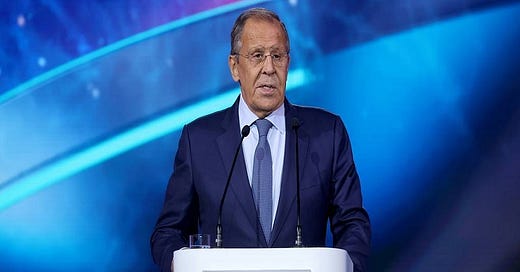Why’d Lavrov Say That Russia Isn’t Alone Yet It Also Can’t Rely On Anyone But Itself?
No country should ever enter into a position of disproportionate dependence whereby they literally come to rely on anyone else, though nor should they isolate themselves from global processes either, hence the need to pragmatically strike a careful balance between these two goals exactly as Russia is doing.
Russian Foreign Minister Lavrov shared two bits of strategic insight into his recently restored world power’s position in International Relations last week that some casual observers might consider contradictory. On Wednesday, he said that “During the era we are now living through, and it is precisely an era, a long historical period, we have to be prepared to realize we have nobody to rely on but ourselves.” The day after, he then said that “We are not alone at all, they are trying to isolate us but these attempts are destined for failure”, after which he referenced the fact that the majority of humanity across the Global South refused to sanction Russia despite immense US pressure.
These statements do indeed appear to be contradictory on the surface, but upon thinking a bit more deeply about them, everything makes sense and is perfectly consistent. On the one hand, the global systemic transition to multipolarity has unprecedentedly exacerbated preexisting chaotic processes in International Relations and thus made it so that the hyper-realist school of thought came to the forefront of every state’s policymaking calculations. In simple terms, all players are nowadays prioritizing self-reliance and the maximization of their strategic autonomy in the New Cold War between the US-led West’s Golden Billion and the BRICS-led Global South.
On the other hand, however, all members of the second-mentioned emerging bloc share the same grand strategic interests with respect to accelerating the global systemic transition to multipolarity through the creation of attendant institutions and resultant restoration of the UN Charter as the basis for regulating relations between them. This has taken the form of the Russia-India-China (RIC) framework becoming the engine of these complex processes whereby Moscow is actively multi-aligning between its top two strategic partners in Delhi and Beijing. India’s role is to preemptively avert Russia’s potentially disproportionate dependence on Beijing while China’s is to actively confront the US with Moscow.
Furthermore, the Chinese-Indian Strategic Partnership has the exciting possibility of functioning as the core of the Asian Century, which will in turn ensure the rise of Africa and the eventual outcome of the Afro-Asian Century that’ll finally restore equality, fairness, and justice to the entire Global South. Taken together, the complex interactions within RIC are comprehensively reshaping International Relations in irreversible ways, though everything must still be carefully balanced in order to guarantee the success of this ambitious vision. Therein lies the importance of all players prioritizing self-reliance and their strategic autonomy in parallel with pragmatically cooperating with likeminded partners.
The insight that was shared in this analysis should therefore help casual observers make sense Lavrov’s multipolar worldview. His statements about how Russia isn’t alone in the world yet it can still only rely upon itself aren’t mutually exclusive but pragmatic, embodying the spirit of multi-alignment that was first pioneered by India over the last decade but has since become the norm in International Relations. No country should ever enter into a position of disproportionate dependence whereby they literally come to rely on anyone else, though nor should they isolate themselves from global processes either, hence the need to pragmatically strike a careful balance between these two goals exactly as Russia is doing.




